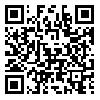Sat, Jan 31, 2026
Volume 34, Issue 2 (2-2024)
JHNM 2024, 34(2): 159-166 |
Back to browse issues page
Download citation:
BibTeX | RIS | EndNote | Medlars | ProCite | Reference Manager | RefWorks
Send citation to:



BibTeX | RIS | EndNote | Medlars | ProCite | Reference Manager | RefWorks
Send citation to:
Kamali M, Mousavi S K, Akbari F, Khodabandeh M, Moharramkhani M. Relationship Between Personality Traits and Health Anxiety Among Nurses. JHNM 2024; 34 (2) :159-166
URL: http://hnmj.gums.ac.ir/article-1-2313-en.html
URL: http://hnmj.gums.ac.ir/article-1-2313-en.html
Mohsen Kamali1 

 , Seyed Kazem Mousavi *2
, Seyed Kazem Mousavi *2 

 , Fatemeh Akbari3
, Fatemeh Akbari3 

 , Marzieh Khodabandeh3
, Marzieh Khodabandeh3 

 , Marzieh Moharramkhani3
, Marzieh Moharramkhani3 




 , Seyed Kazem Mousavi *2
, Seyed Kazem Mousavi *2 

 , Fatemeh Akbari3
, Fatemeh Akbari3 

 , Marzieh Khodabandeh3
, Marzieh Khodabandeh3 

 , Marzieh Moharramkhani3
, Marzieh Moharramkhani3 


1- Instructor, Department of Nursing, Abhar School of Nursing, Zanjan University of Medical Sciences, Zanjan, Iran.
2- PhD Candidate of Nursing, Instructor, Department of Nursing, Abhar School of Nursing, Zanjan University of Medical Sciences, Zanjan, Iran. ,kazemmoosavi69@gmail.com
3- Nursing (BSN), Department of Nursing, Abhar School of Nursing, Zanjan University of Medical Sciences, Zanjan, Iran.
2- PhD Candidate of Nursing, Instructor, Department of Nursing, Abhar School of Nursing, Zanjan University of Medical Sciences, Zanjan, Iran. ,
3- Nursing (BSN), Department of Nursing, Abhar School of Nursing, Zanjan University of Medical Sciences, Zanjan, Iran.
Abstract: (1335 Views)
Introduction: The unique occupational nature of the nursing profession creates anxiety as the most common psychiatric disorder among nurses.
Objective: This study investigated the relationship between personality traits and health anxiety among nurses.
Materials and Methods: In this analytical cross-sectional descriptive study, 185 nurses from six teaching hospitals affiliated with Zanjan University of Medical Sciences in Iran were selected by stratified random sampling. Data collection tools included a demographic questionnaire; neuroticism, extraversion, openness personality inventory, NEO 5factor inventory (NEOFFI) personality traits (short form), and health anxiety inventory (HAI), which the participants completed by the self-report method. The obtained data were analyzed using descriptive (frequency, percentage, Mean±SD) and inferential (the independent t-test, ANOVA, the Pearson correlation, and multiple linear regression) statistics.
Results: The participants’ Mean±SD age was 34.83±8.26 years. About 58.4% of the nurses were female, and most were married (82.2%). Nurses’ Mean±SD score of health anxiety was 22.86±4.05. The results of the NEO personality questionnaire showed that the highest mean (29.34±8.40) was related to the conscientiousness personality trait and the lowest to extroversion (25.53±8.64). The findings showed a positive and significant relationship between health anxiety and neurotic personality trait (P=0.001, r=0.411) and negative relationships with extraversion (P>0.05, r=-0.199) and openness to extroversion (β=-0.19, 95%CI, -0.66%, -0.04%, P=0.039) personality traits. Also, neuroticism (β=0.23, 95%CI, 0.06%, 0.8%, P=0.012) and extroversion (β=-0.19, 95%CI, 0.66% to 0.04%, P=0.039) personality traits can predict health anxiety in nurses. The findings revealed that 7.9% of the variance of health anxiety could be explained by the nurse’s personality traits (F=2.81, R=0.256, R2=0.098, adjusted R2=0.079, P<0.05).
Conclusion: According to the study results and considering the importance of nurses’ quality of performance, it is recommended that nurses with personality traits vulnerable to anxiety be identified, and the necessary training will be provided to them in the form of anxiety control and management workshops.
Objective: This study investigated the relationship between personality traits and health anxiety among nurses.
Materials and Methods: In this analytical cross-sectional descriptive study, 185 nurses from six teaching hospitals affiliated with Zanjan University of Medical Sciences in Iran were selected by stratified random sampling. Data collection tools included a demographic questionnaire; neuroticism, extraversion, openness personality inventory, NEO 5factor inventory (NEOFFI) personality traits (short form), and health anxiety inventory (HAI), which the participants completed by the self-report method. The obtained data were analyzed using descriptive (frequency, percentage, Mean±SD) and inferential (the independent t-test, ANOVA, the Pearson correlation, and multiple linear regression) statistics.
Results: The participants’ Mean±SD age was 34.83±8.26 years. About 58.4% of the nurses were female, and most were married (82.2%). Nurses’ Mean±SD score of health anxiety was 22.86±4.05. The results of the NEO personality questionnaire showed that the highest mean (29.34±8.40) was related to the conscientiousness personality trait and the lowest to extroversion (25.53±8.64). The findings showed a positive and significant relationship between health anxiety and neurotic personality trait (P=0.001, r=0.411) and negative relationships with extraversion (P>0.05, r=-0.199) and openness to extroversion (β=-0.19, 95%CI, -0.66%, -0.04%, P=0.039) personality traits. Also, neuroticism (β=0.23, 95%CI, 0.06%, 0.8%, P=0.012) and extroversion (β=-0.19, 95%CI, 0.66% to 0.04%, P=0.039) personality traits can predict health anxiety in nurses. The findings revealed that 7.9% of the variance of health anxiety could be explained by the nurse’s personality traits (F=2.81, R=0.256, R2=0.098, adjusted R2=0.079, P<0.05).
Conclusion: According to the study results and considering the importance of nurses’ quality of performance, it is recommended that nurses with personality traits vulnerable to anxiety be identified, and the necessary training will be provided to them in the form of anxiety control and management workshops.
Article Type : Research |
Subject:
General
Received: 2024/02/28 | Accepted: 2024/02/21 | Published: 2024/02/21
Received: 2024/02/28 | Accepted: 2024/02/21 | Published: 2024/02/21
Send email to the article author
| Rights and permissions | |
 | This work is licensed under a Creative Commons Attribution-NonCommercial 4.0 International License. |



